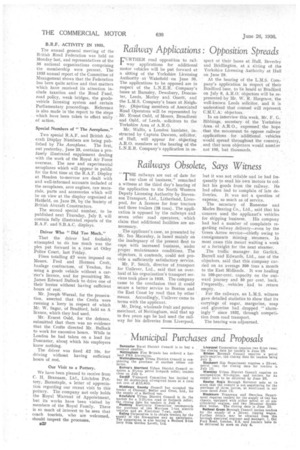Railways Obsolete, Says Witness
Page 64

If you've noticed an error in this article please click here to report it so we can fix it.
'THE railways are out of date for
1 our class of business," remarked a witness at the third day's hearing of the application to the North Western Deputy Licensing Authority by Stevenson Transport, Ltd., Litherland, Liverpool, for A licences for four tractors and three trailers (28 tons). The application is opposed by the railways and seven other road operators, which claim that additional facilities are unnecessary.
The applicant's case, as presented by Mr. Ian Macaulay, is based mainly on the inadequacy of the present fleet to cope with increased business, under proper maintenance conditions. The objectors, it contends, could not provide a sufficiently satisfactory service.
Mr. F. Smith, director of transport for Unilever, Ltd., said that an overhaul of his organization's transport services took place in 1935. The company came to the conclusion that it could secure a better service to Boston and the East Coast by road than by other means. Accordingly, Unilever came to terms with the applicant.
Mr. Dring, wholesale fruit and potato merchant, of Nottingham, said that up to five years ago he had used the railway for his deliveries from Liverpool, but it was not reliable and he had frequently to send his own motors to collect his goods frotn the railway. He had often had to complain of late de liveries. It was not a question of expense, so much as of service.
The secretary of Ransome and Marles Bearing Co., Ltd., said that his concern used the applicant's vehicles for shipping business, His company had had a number of complaints regarding railway delivery—even by the Green Arrow service—chiefly owing to consignments missing steamers. In most cases this meant waiting a week or a fortnight for the next steamer.
The traffic manager for Garlick, Burrell and Edwards, Ltd., one of the objectors, said that this company carried on an average 300 tons a month to the East Midlands. It was hauling to 100-per-cent. capacity on the ou.tward journey and 50 per cent. back. Frequently, vehicles had to return empty.
For the railways, an L.M.S. witness gave detailed statistics to show that its carryings of sugar, margarine, soap and glycerine had dropped" alarm
ingly since 1932, through competition from road transport. The hearing was adjourned.












































































































































